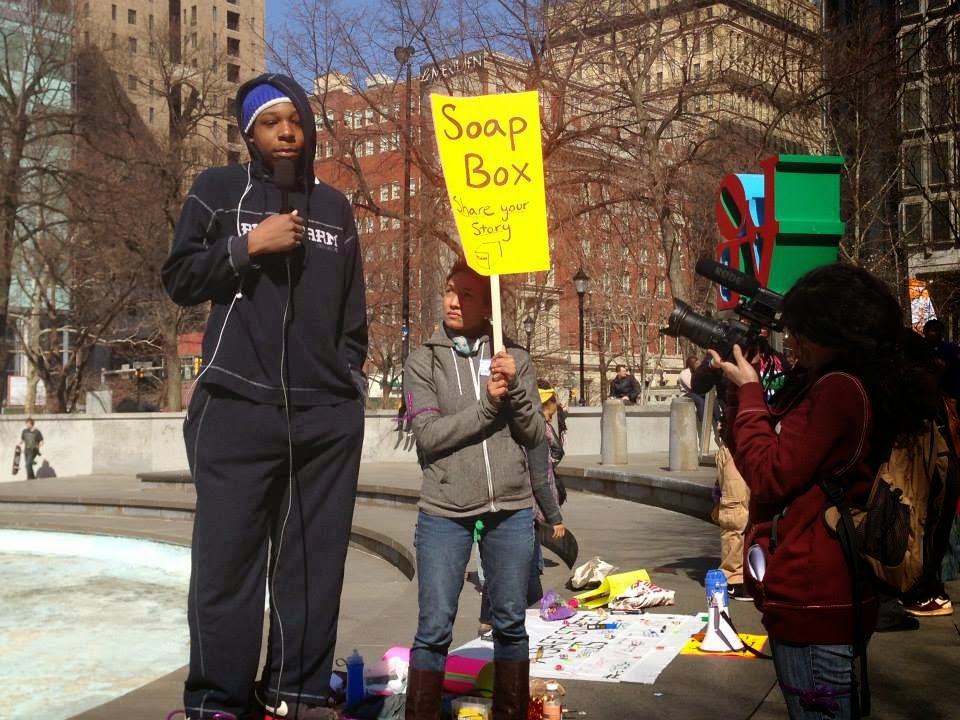Nov. 25 – Dec. 10 are the 16 Days of Activism Against Gender-Based Violence. To commemorate the week, we are featuring 1 activism idea per day. This information is excerpted from my new book Stop Global Street Harassment: Growing Activism Around the World (Praeger 2015).
Initiating a street demonstration by holding signs with anti-harassment messages, asking people to write their own messages, and facilitating impromptu conversations are additional tactics growing in popularity among people wishing to challenge street harassment in their community. These types of actions have taken place in many countries, including Jordan, Egypt, Chile, India, and the United States.

In June 2012, more than 200 people in Amman, Jordan, formed a “human chain” from Al Hussein Sports City to the Interior Ministry Circle to protest various gender-based crimes, including street harassment, the practice of forcing rape survivors to marry their rapists, and honor killings. Women and men of all ages stood in a row, each holding signs that condemned these acts and called for behavioral changes and changes to laws. Weeks later in Egypt, the Nefsi (I Hope) anti-sexual harassment campaign also organized scores of people into a human chain along a busy road in Cairo. Some of the participants’ signs read “I wish I could ride a bike without anyone bothering me” and “I wish you would respect me as I respect you.”
In 2014, Observatorio Contra el Acoso Callejero en Chile held an open outdoor meeting at a plaza where more than two dozen women and men of all ages discussed street harassment, passed out pamphlets to passersby, and wrote anti-street harassment messages on signs like “Mi cuerpo no es un objeto” (“My body is not an object”) and “Yo me visto para mi no para ti” (“I dress for me not for you”). They held the signs for passersby to see and then attached them to strings hung around the plaza. They also attached small ribbons on which they had written their street harassment experiences, and people walking by stopped to read them.

In Bangalore, India, members of the volunteer group Jhatkaa spent a day in 2014 walking around the streets of the city with a whiteboard and asking women to write down their experiences with street harassment. People were eager to participate and wrote statements like, “Lots of times men have pinched my breasts and made passes at me on the buses,” “Been whistled and stared at wearing a pair of jeans,” and “The creepy stare.” The organizers wrote in a summary of their event: “Many women thanked us for doing it and told us they felt lighter after speaking about it and participating in fighting against it. On seeing photos of other women and their experiences-they also felt good knowing that they weren’t the only ones. We shared these photos on Facebook and Twitter and received positive comments for the work.”

Since 2011, Philadelphia-based groups like FAAN Mail and Feminist Public Works have held a demonstration in the spring. It includes drumming, chalking, and posting flyers and signs and discussing street harassment with passersby. In 2014, they framed it as reclaiming public space at LOVE Park and hosted chalking, street theater, music, art making, and double Dutch jump rope. People could write their answers to complete the phrase “A Safe Street is …,” and several chose to publicly share their street harassment stories while standing on a “soap box.” Around 50 people participated. “This year’s action in Philadelphia was our most dynamic action yet,” wrote FAAN Mail co-founder Nuala Cabral in a report of the event. We offered several activities that enabled people to reclaim public space and address this problem in creative ways. Children were a part of the event. Male allies stood with us. It was a beautiful day.”
Help fund our work in 2016, donate to our end-of-year giving campaign!
